God's Purpose: Praise From All Nations, (#2): Israel in Exile, The Church, The Millennium, Eternity
"God's Purpose: Praise from All Nations" part two (of three) continues to examine God's intention to bless all nations and peoples of the earth as the background for the church's call to world evangelism or missions.
In Psalm 2:12, the Aramaic word "Son" emphasizes the Son of God as the object of saving faith for all peoples. The next use of Aramaic is Jeremiah 10:11:
Thus shall ye say unto them, The gods that have not made the heavens and the earth, even they shall perish from the earth, and from under these heavens.
All nations must know that Jehovah alone is the true God, while all false gods will perish from the earth and from under these heavens.They are just dead statues. The call goes out to the nations of the world, in their language, to forsake their idols for the one God, the living God who made the heavens and the earth and is Sovereign over nature now (Jeremiah 10:11) and submit to and trust in His Son (Psalm 2).
The next portion of Aramaic Scripture is Daniel 2:4-7:28. In Daniel 2, God wants all the nations to know that He is Lord of all (Daniel 2:44). Then in Daniel 3 God wants the nations to know the narrative about how He delivered Daniel’s three friends from the burning fiery furnace when they refused to worship Nebuchadnezzar’s idol:
He answered and said, Lo, I see four men loose, walking in the midst of the fire, and they have no hurt; and the form of the fourth is like the Son of God. (Daniel 3:25)
The Son of God, in whom Shadrach, Meschach, and Abednego were trusting (Psalm 2:12) delivered His people from the fire, as Isaiah 43:2 had promised, in the context of the fact that Jehovah would regather His people after the exile:
When thou passest through the waters, I will be with thee; and through the rivers, they shall not overflow thee: when thou walkest through the fire, thou shalt not be burned; neither shall the flame kindle upon thee.
So Jehovah God the Son delivered His redeemed people from the fire, and He delivers all who trust in Him from the everlasting fires of hell. This message about the salvation wrought by the Son of God goes to the end of the Babylonian empire (Daniel 3:25-30).
Daniel 4 shows how Jehovah is able to turn the most powerful king into someone who acted like a beast in the field until he humbled himself before the one true God. Daniel 5 shows what happens to Belshazzar when he does NOT humble himself before the one true God. Daniel 6 records a decree about Israel's God saving Daniel from the lions that goes to the ends of the Medo-Persian empire.
The God of Daniel is the “living God” (6:20), Daniel receives salvation because he “believed in his God” (6:23), while the enemies of Daniel and his God are destroyed (6:24). Darius then issues a decree instructing “all people, nations, and languages, that dwell in all the earth” that “men tremble and fear before the God of Daniel: for he is the living God, and stedfast for ever, and his kingdom that which shall not be destroyed, and his dominion shall be even unto the end,” and he “delivereth and rescueth” (6:26-6:27)—all nations of the earth are to hear the message that the one living and true God is the Savior.
The climax of the Aramaic portion of Daniel is the vision of the Messiah, the Son of Man, coming to rule and save in Daniel 7. He destroys the greatest manifestation of Satan’s power and the power of this world, the Antichrist. He is truly human—He is “Son of MAN.” But He comes “with the clouds of heaven” (7:13)—this image is used for God’s presence and activity in judging His enemies and saving His saints. So the Son of Man is also Divine, possessing the Divine glory, possessing free access into the presence of the Father, and ruling the entire world.
Ezra 4:7-6:18; 7:12-26 is written in Aramaic. The God of the Jews is the God of heaven; His temple in Jerusalem the place of His worship. The nations are to know where the God of heaven has His place of worship (which is also the place where the sacrifices were offered, every sacrifice preaching the gospel in a picture—so the heathen were to know the place where the gospel was preached and God worshipped.)
The book of Esther records that the Persian empire spread “from India even unto Ethiopia, over an hundred and seven and twenty provinces” (Esther 1:1). They ruled much of Asia, parts of Africa, and were expanding into Europe. The Jews were found in every province (Esther 3:8). As a result of
the glorious providential dealings of God in the book of Esther "many of the people of the land became Jews" (Esther 8:17) in all 127 Persian provinces from India to Ethiopia!
Outside of Scripture, the Lemba people, in Zimbabwe and South Africa have Jewish ancestry.
Israel was to bless all nations with knowledge of the God of the gospel, and the message spread very widely from the center of the earth, Jerusalem, out to Africa, Asia, Europe, and perhaps even from the ends of Asia into the New World.
In the church age the gospel also spread greatly. Amen!
-
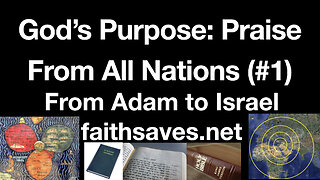 53:34
53:34
KJBIBLE1611
1 year agoGod's Purpose: Praise From All Nations, (#1): The Ages of Adam, Noah, Abraham, Israel, Moses & David
406 -
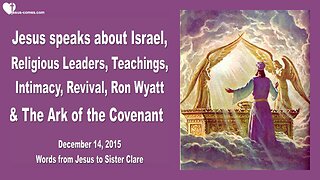 12:17
12:17
News from Jesus
1 year agoDec 14, 2015 ❤️ Jesus speaks about Israel, religious Leaders, Revival, Ron Wyatt and Ark of the Covenant
796 -
 16:12
16:12
The Third Testament
1 year agoChrist's Kingdom of Peace and Consummation...The new Man and the new Earth ❤️ The Third Testament Chapter 58-1
159 -
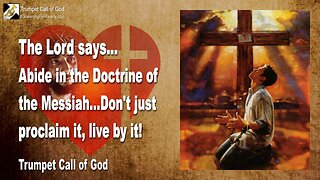 11:29
11:29
Trumpet Call of God
1 year agoJune 28, 2006 🎺 The Lord says... Abide in the Doctrine of the Messiah... Don't just proclaim it, live by it
64 -
 10:52
10:52
songandverse
3 years ago $0.04 earnedDaily Bible Study: Daniel 3 | I'll Be There (Megadeth) | Song & Verse Ministries
3712 -
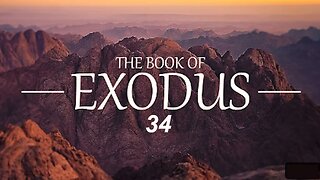 53:27
53:27
Straitway Life
1 year agoExodus Torah Study: Yahweh Elohim ( God ) Is Looking For This Kind Of Worship From His People Israel
373 -
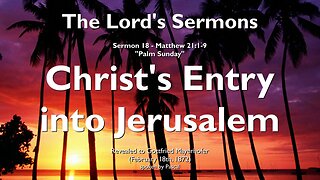 13:34
13:34
Jesus Christ reveals thru Gottfried Mayerhofer
1 year agoChrist's Entry into Jerusalem & Into the Hearts of Men ❤️ Jesus elucidates Matthew 21:1-9
91 -
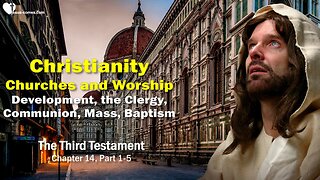 21:48
21:48
The Third Testament
1 year agoChristianity, Churches & Worship... Clergy, Communion, Mass & Baptism ❤️ 3rd Testament Chapter 14-1
81 -
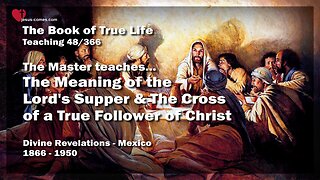 38:20
38:20
The Book of the true Life
1 year agoMeaning of the Lord's Supper & Cross of a Follower of Christ ❤️ Book of the true Life Teaching 48 / 366
146 -
 24:05
24:05
Jesus' Revelations thru Jakob Lorber English
1 year agoJesus explains the Path to eternal Life in the Kingdom of God ❤️ How do I become Jesus' Disciple ?..
288